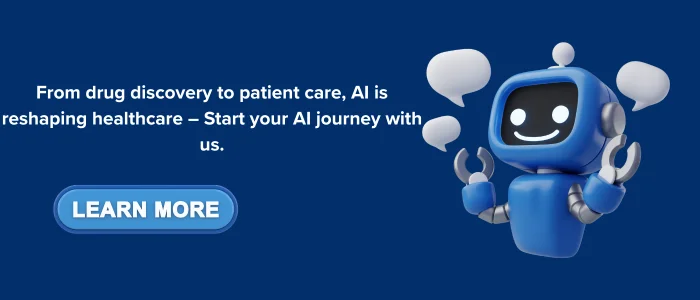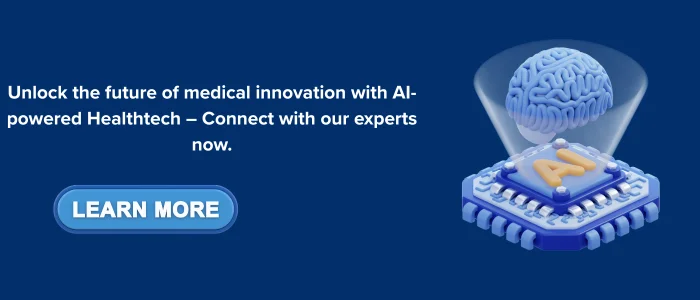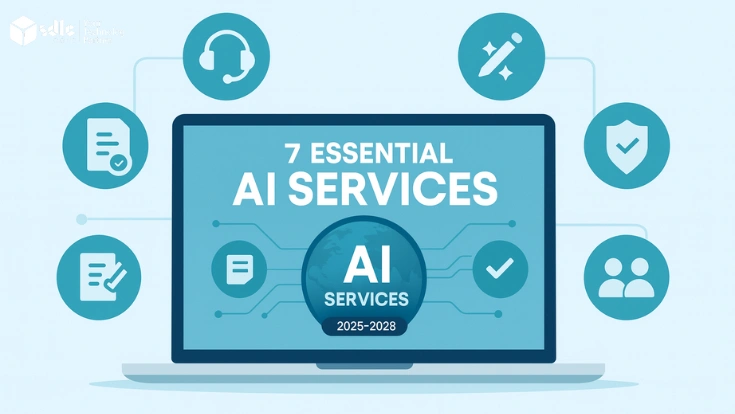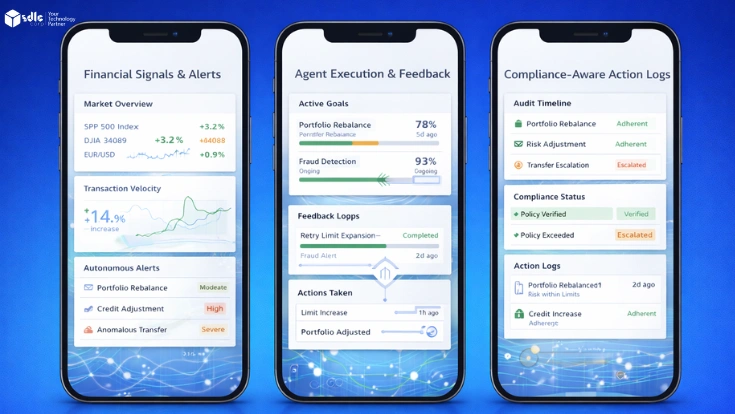Introduction
The healthcare industry is witnessing a paradigm shift with the integration of Generative AI in Healthcare. From early disease detection to creating new drug formulations, AI-powered Healthtech is revolutionizing how medical professionals and patients interact with technology. Unlike traditional AI, which mainly focuses on predictive analytics, generative AI goes a step further creating new possibilities such as generating medical images, designing synthetic patient data for research, and assisting in personalized treatment plans.
The use of Healthcare Automation AI is not just about improving efficiency; it is about saving lives, reducing medical errors, and making healthcare accessible to everyone. This blog explores in detail how Generative AI applications in medicine are shaping diagnostics, treatment, research, and patient care, while also addressing challenges, ethical considerations, and future possibilities.
Understanding Generative AI in Healthcare
Generative AI refers to advanced artificial intelligence models that can generate new content be it text, images, molecules, or even synthetic data based on learned patterns. In healthcare, this technology is applied in numerous ways, from medical diagnostics AI to generative AI medical imaging and AI for drug discovery.
Use of Generative AI in Healthtech Systems:
Healthtech platforms manage sensitive data, complex workflows, and strict regulatory requirements. Generative AI can support these systems by assisting with clinical documentation, patient communication summaries, and medical knowledge retrieval. Many organisations start by exploring Generative AI development services to build models that align with healthcare data standards and operational constraints.
Key Capabilities of Generative AI in Healthtech
Clinical Documentation and Workflow Support:
Healthcare teams often spend significant time on documentation and reporting. Generative AI can help reduce this burden by drafting visit summaries, structuring clinical notes, and supporting administrative tasks. To ensure accuracy and safety, some organisations choose to hire generative AI developers who understand healthcare data formats, privacy rules, and validation requirements.
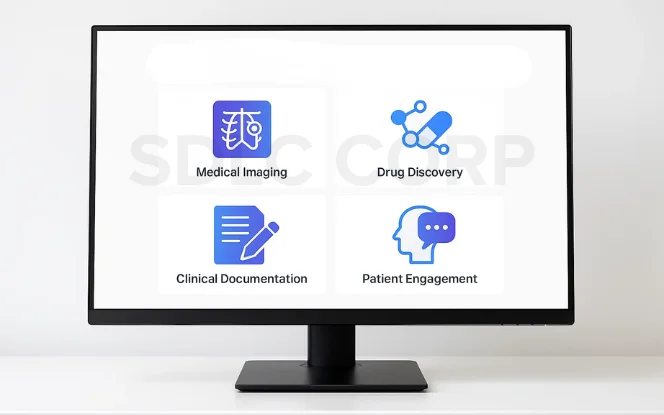
- Data Synthesis: Creating synthetic patient records for research without compromising privacy.
- Image Generation: Producing highly detailed medical imaging scans for training diagnostic models.
- Drug Molecule Creation: Designing novel molecular structures that speed up drug discovery.
- Personalized Care: Generating custom treatment recommendations tailored to individual patients.
- Healthcare Automation AI: Automating routine tasks to free up healthcare professionals’ time.
By combining the power of machine learning and deep learning with generative models, healthcare providers can access smarter, faster, and safer solutions.
Read More: Generative AI in Manufacturing Startups
Generative AI in Medical Diagnostics
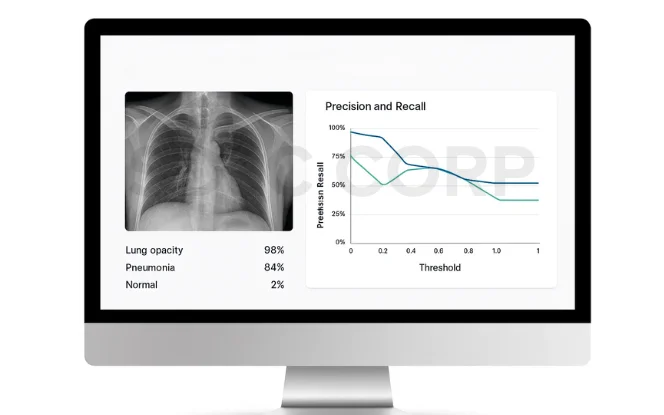
One of the most impactful areas of Generative AI in Healthcare is medical diagnostics. Traditional diagnostic methods often rely heavily on human expertise and manual image interpretation, which can be time-consuming and prone to error. Medical Diagnostics AI addresses this gap by generating precise insights from complex datasets.
Benefits of Generative AI in Diagnostics:
- Enhanced Accuracy: AI-generated medical imaging can detect anomalies invisible to the human eye.
- Early Detection: Predictive analytics in healthcare powered by AI allows for faster identification of diseases.
- Decision Support: Generative AI assists doctors by suggesting probable diagnoses based on patient symptoms and historical data.
- Reduced Costs: Automated diagnostics minimize the need for repeat scans and unnecessary tests.
For example, generative AI medical imaging models can create synthetic MRI or CT scans, which help in training other AI diagnostic systems without needing huge volumes of real patient data. This speeds up the innovation cycle in healthcare.
Personalized Healthcare AI
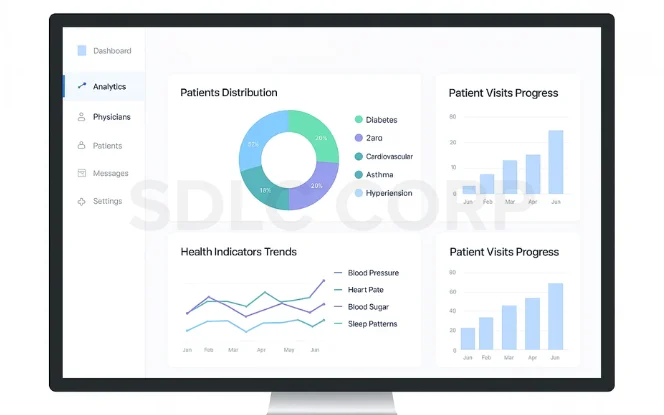
Modern medicine is moving away from the “one-size-fits-all” approach toward personalized treatment plans. Personalized Healthcare AI uses generative models to create individualized solutions based on genetic data, lifestyle, and medical history.
Read More: Generative AI in Manufacturing Startups
Applications of Generative AI in Personalized Care:
- Treatment Simulation: AI generates potential outcomes for different treatment paths, helping doctors select the most effective plan.
- Customized Medication: Drug dosages can be personalized for patients based on their metabolism.
- Virtual Health Assistants: AI chatbots and tools provide personalized health recommendations.
- Behavioral Health: Generative AI models create tailored mental health programs to support patients.
This advancement reduces adverse drug reactions, enhances recovery time, and ensures higher patient satisfaction.
AI for Drug Discovery
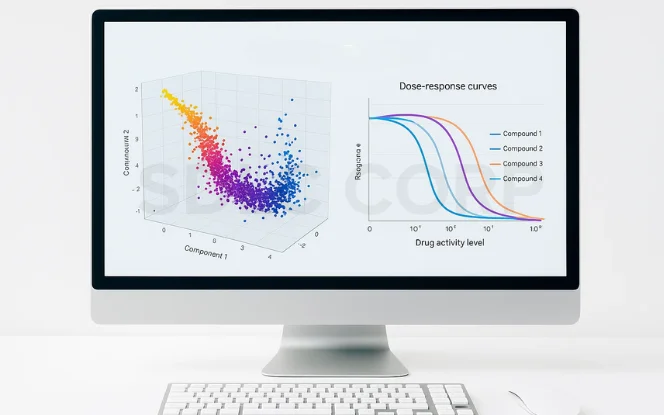
Drug discovery is traditionally a slow and costly process. It often takes more than a decade and billions of dollars to bring a single drug to market. With AI for drug discovery, generative AI accelerates this process by creating new molecules, predicting interactions, and reducing trial-and-error testing.
How Generative AI Transforms Drug Discovery:
- Molecule Design: AI generates new molecular structures with desired therapeutic effects.
- Faster Screening: Generative models predict how drugs will interact with specific proteins.
- Cost Efficiency: Reduces reliance on expensive lab trials.
- AI-Powered Healthtech Collaboration: Pharma companies use AI-powered platforms to streamline R&D.
This technology has already been applied in oncology, infectious diseases, and rare genetic disorders, paving the way for faster cures.
Generative AI in Medical Imaging
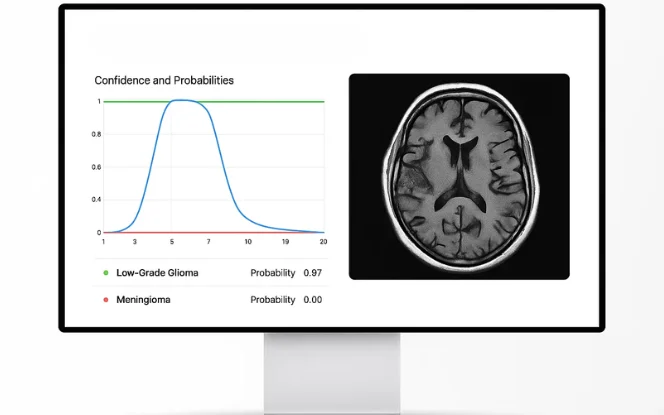
Imaging plays a critical role in diagnosing conditions like cancer, heart disease, and neurological disorders. Generative AI medical imaging is revolutionizing radiology by enhancing image quality, creating synthetic data, and assisting radiologists in accurate interpretation.
Read More: Generative AI for Supply Chain
Advantages of Generative AI Medical Imaging:
- Image Enhancement: AI reduces noise in MRI and CT scans, improving clarity.
- Data Augmentation: Creates synthetic datasets for training AI models without needing millions of real scans.
- Faster Analysis: Automates the detection of tumors, fractures, or abnormalities.
- Remote Diagnostics: Enables telemedicine by generating high-quality images even with low-resolution equipment.
This innovation not only speeds up diagnosis but also bridges the gap in regions with limited access to advanced medical equipment.
AI in Patient Care
Patient care is no longer limited to hospitals and clinics. With the rise of digital platforms, AI in patient care ensures continuous monitoring, proactive health management, and real-time assistance.
Examples of Generative AI in Patient Care:
- Virtual Nursing Assistants: Available 24/7 to answer queries and provide medication reminders.
- Remote Monitoring: AI generates insights from wearable devices to track heart rate, glucose levels, and oxygen saturation.
- Predictive Analytics in Healthcare: Identifies potential health risks before they escalate.
- Healthcare Automation AI: Streamlines administrative tasks such as scheduling, billing, and insurance claims.
This shift improves patient engagement and helps healthcare providers deliver holistic care.
Predictive Analytics in Healthcare
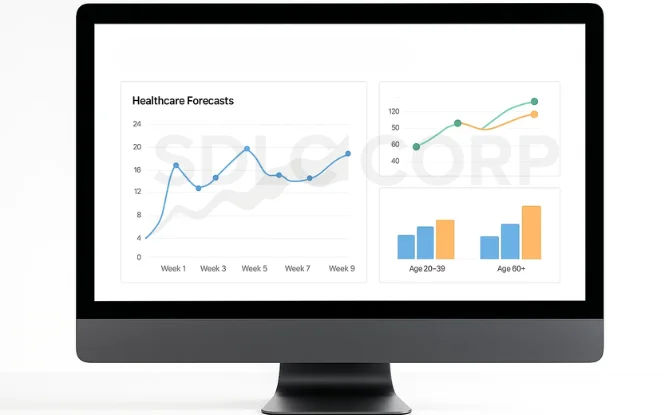
Predictive analytics powered by generative AI allows hospitals and clinics to forecast trends, patient outcomes, and even disease outbreaks. By analyzing historical and real-time data, predictive analytics in healthcare enables proactive rather than reactive care.
Key Benefits:
- Risk Prediction: Identifying high-risk patients for chronic conditions.
- Resource Optimization: Predicting hospital admissions to manage staffing levels.
- Treatment Outcomes: Estimating recovery rates and patient responses.
- Public Health Management: Anticipating epidemic outbreaks.
Predictive healthcare models reduce readmission rates, optimize resources, and enhance decision-making.
Read more : Generative AI Automotive Industry
Generative AI Applications in Medicine
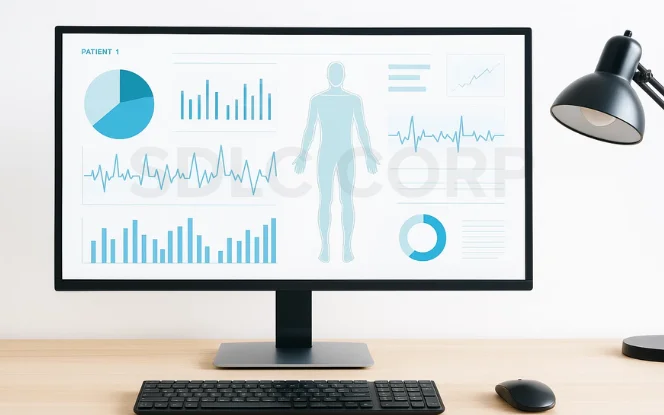
Broader Applications Include:
- Medical Research: Generating large-scale datasets for clinical trials.
- Surgical Assistance: AI generates 3D models for surgical planning.
- Medical Education: Virtual simulations created by AI help train doctors.
- Mental Health: AI-generated therapy chatbots provide support for stress, anxiety, and depression.
These diverse applications underline how generative AI is becoming a cornerstone of modern healthcare systems.
Ethical and Regulatory Considerations
While AI-powered Healthtech offers enormous benefits, it also raises ethical and legal concerns. Key issues include:
- Data Privacy: Protecting patient records from misuse.
- Bias in AI Models: Ensuring algorithms are not skewed by biased training data.
- Accountability: Determining who is responsible for AI-driven medical errors.
- Regulatory Compliance: Ensuring generative AI meets global healthcare standards.
Governance, Compliance, and Risk Management:
Healthtech applications operate under regulations such as HIPAA and GDPR. Generative AI systems must follow clear rules around data access, auditability, and output review. In this context, working with a Generative AI consulting company helps teams assess risks, define guardrails, and ensure models are used appropriately within regulated healthcare environments.
To achieve widespread adoption, governments and organizations must create frameworks that balance innovation with patient safety.
Also Read: AI For Human Resources
Challenges in Adopting Generative AI in Healthcare
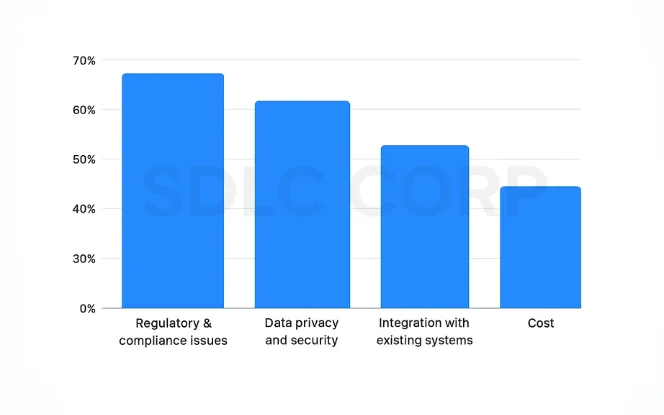
- High Implementation Costs – Advanced AI models require significant investment.
- Lack of Skilled Workforce – Training healthcare professionals to work with AI systems is essential.
- Integration Issues – Incorporating AI into legacy healthcare systems can be complex.
- Trust Factor – Patients and doctors must build trust in AI-generated recommendations.
Addressing these challenges will determine the pace at which healthcare automation AI becomes mainstream.
Also Read: AI in Media and Entertainment
Future of Generative AI in Healthcare

The future of generative AI in healthcare is incredibly promising. With advancements in quantum computing, IoT integration, and cloud-based AI platforms, the scope of applications will only expand. We can expect:
- Hyper-Personalized Medicine – AI will create real-time treatment strategies unique to every patient.
- AI-Driven Preventive Care – Predictive models will focus on preventing diseases rather than treating them.
- Global Health Equity – Affordable AI solutions will bring advanced care to developing nations.
- Human-AI Collaboration – Doctors will work alongside AI as trusted partners, enhancing decision-making.
Generative AI has the potential to shift healthcare from a reactive model to a proactive, preventive, and highly personalized one.
Integration with Broader AI Healthtech Platforms
Generative models rarely work in isolation. They are often part of larger systems that include predictive analytics, decision-support tools, and automation workflows. Healthtech providers may rely on AI development services to integrate generative AI with existing platforms while maintaining system reliability and data integrity.
Conclusion
Generative AI is no longer just a futuristic concept it is already transforming how we diagnose, treat, and care for patients. From medical diagnostics AI and AI for drug discovery to personalized healthcare AI and healthcare automation AI, the impact is vast and undeniable. The use of predictive analytics in healthcare and generative AI medical imaging ensures that both patients and providers benefit from faster, safer, and more accurate outcomes.
However, with great power comes responsibility. Ethical use, transparent regulations, and continuous innovation will be key to ensuring the safe deployment of generative AI applications in medicine. As we move forward, one thing is clear AI-powered Healthtech is set to redefine the future of global healthcare.
FAQ's
How is AI-powered Healthtech transforming the medical industry?
AI-powered Healthtech is revolutionizing healthcare by automating processes, improving diagnostics, and streamlining hospital workflows. From virtual health assistants to real-time monitoring, it ensures better efficiency and accessibility for both patients and providers.
Why is Medical Diagnostics AI important in modern healthcare?
Medical Diagnostics AI enhances the accuracy and speed of disease detection. By analyzing imaging scans and patient data, it supports doctors in making reliable diagnoses, reducing misinterpretations, and ensuring early detection of complex conditions.
How does Personalized Healthcare AI benefit patients?
Personalized Healthcare AI tailors treatments, medications, and care plans to individual needs based on genetics, lifestyle, and medical history. This approach reduces side effects, improves recovery time, and enhances patient satisfaction.
What role does AI play in Drug Discovery?
AI for Drug Discovery accelerates the creation of new drugs by designing molecules, predicting protein interactions, and simulating clinical outcomes. It reduces research costs and speeds up the delivery of life-saving treatments.
How is Generative AI Medical Imaging used in Patient Care?
Generative AI Medical Imaging enhances scan quality, creates synthetic images for training, and assists radiologists in detecting diseases. In AI in Patient Care, it supports faster diagnosis, remote consultations, and continuous health monitoring.

